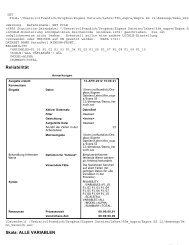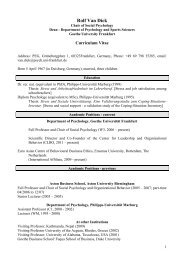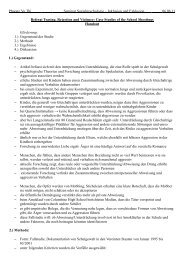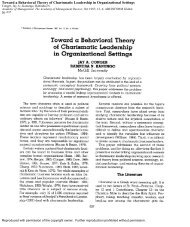Leadership-Interview-Transkript - Sozialpsychologie - Goethe ...
Leadership-Interview-Transkript - Sozialpsychologie - Goethe ...
Leadership-Interview-Transkript - Sozialpsychologie - Goethe ...
Sie wollen auch ein ePaper? Erhöhen Sie die Reichweite Ihrer Titel.
YUMPU macht aus Druck-PDFs automatisch weboptimierte ePaper, die Google liebt.
the 21 st century challenge, but we can no longer utilize 20 th century approaches to the 21 st<br />
century challenge – so we need that combination.<br />
Rolf van Dick: I perfectly agree, but why don’t we see it so often – or the opposite: Why do<br />
we experience bad leadership so often? Why do people – leaders – still commit to<br />
McGregor’s Theory X and think that people have to be controlled and monitored all the time<br />
and are inherently lazy, with the effects that people are demotivated, that we have a lot of<br />
absenteeism and burnout and these problems in the workplace… Why is that?<br />
Patrick Cowden: Yeah, that is a big, big question, and I think there is a lot of schools of<br />
thought around the world that have asked that question since 1960, you know, why hasn’t that<br />
been implemented in a manner, in real life business? Because the logic is associated with how<br />
we look on it, and every experiment you do will verify and validate that. So it is an important<br />
question and I do not think there is a single answer yet on it. But I believe a big part of the<br />
systematic process, since the terroristic times of how the industrial revolution came about, a<br />
big part of how big companies work today is based on centralized commanded control<br />
systems. And those are anchored in the days of terrorism, and because of that a lot of<br />
mechanisms around the manager force him to revert to a type, as Douglas McGregor would<br />
say, which is the ‘X-type’ of leadership. Because the systems around you force you into that<br />
corner sometimes. A lot of managers break out of that, into the ‘Y-type’, open leadership, and<br />
trust and empower the employees to really go their own path with a lot of trust, because they<br />
are self-motivated, right. That happens because people believe in their own values stronger<br />
than the systematic system around them. The reason the ‘Mittelstand’ is so successful in<br />
Germany, is because the systematic environment is much smaller and much flatter so that it<br />
allows the type of leadership, the ‘Y-leadership’, to be more prevalent. Especially those<br />
environments where still the family and the people that have a love for what they do, they<br />
love their employees, so they are very close together. That allows more the ‘Y-type’<br />
leadership to happen. I think we have got a system issue, a global system issue now, that has<br />
actually become more extreme in the last 4 or 5 years because of the mechanisms of the 20 th<br />
century commanded control encounting the realities of the 21 st century multi-polar global<br />
business. And you see that in some of the political environments, in Africa, in other places,<br />
where that centralized tyranny of control has failed miserably because of the new systems of<br />
communication and openness on the social media side that have changed the ways the<br />
political systems have to work, or guess what, we have that in business for a long time. We<br />
have to encounter that reality and we have to change the system. It is not the people that is the<br />
issue, it is the systems they are working at.<br />
Rolf van Dick: Ok, but some people might argue that at least for some organizations like the<br />
military, for example, you need that clear structure, you need clear hierarchies etc. Would you<br />
agree that the type of leadership that you have in mind working best is probably not suited for<br />
every organization the same?<br />
Patrick Cowden: Well, I would argue against that point, and actually some of the biggest<br />
proponents of McGregor’s theories on the ‘Y’-side were generals and admirals in the military,<br />
in the United States Military at the time. You know, being people driven and people oriented,<br />
does not mean you are not structured, it does not mean you are not clear, it does not mean you<br />
are not quick in regards to decisions and making things happen. That is what the military is<br />
known for. You have to decide quickly, you have to move quickly, you need clear structures,<br />
a great info structure, great logistics, and you have to move fast and be very agile. That is not<br />
counter to one another. You can have the methodical side of clarity and transparency and<br />
clear lines of communication and… I call it ‘direction’, but you can have a very strong
















